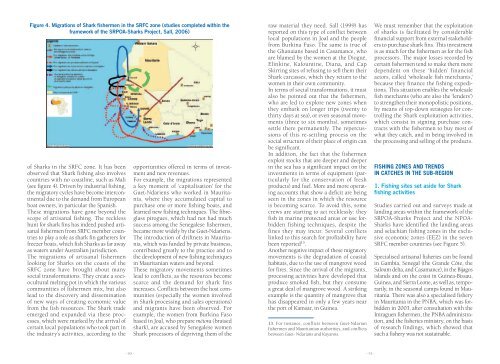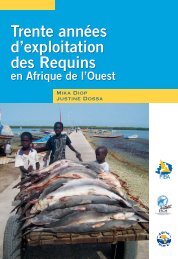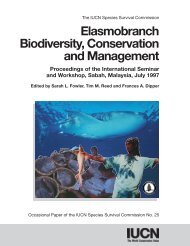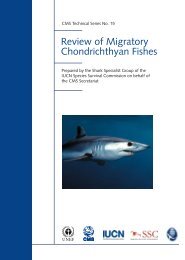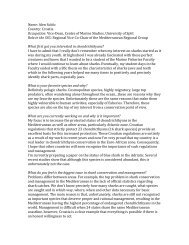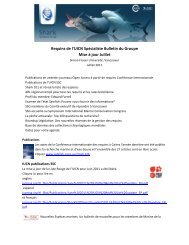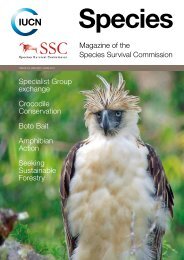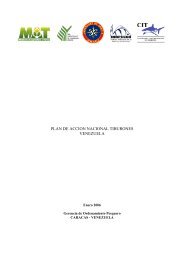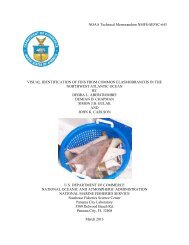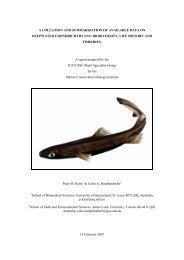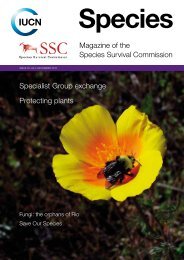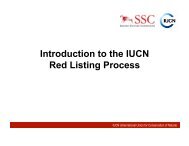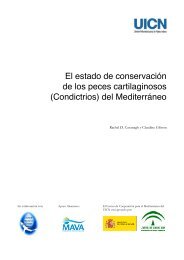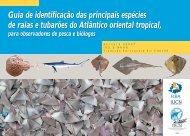30 Years of shark fishing in west africa - Shark Specialist Group
30 Years of shark fishing in west africa - Shark Specialist Group
30 Years of shark fishing in west africa - Shark Specialist Group
Create successful ePaper yourself
Turn your PDF publications into a flip-book with our unique Google optimized e-Paper software.
Figure 4. Migrations <strong>of</strong> <strong>Shark</strong> fishermen <strong>in</strong> the SRFC zone (studies completed with<strong>in</strong> the<br />
framework <strong>of</strong> the SRPOA-<strong>Shark</strong>s Project, Sall, 2006)<br />
<strong>of</strong> <strong>Shark</strong>s <strong>in</strong> the SRFC zone. It has been<br />
observed that <strong>Shark</strong> <strong>fish<strong>in</strong>g</strong> also <strong>in</strong>volves<br />
countries with no coastl<strong>in</strong>e, such as Mali<br />
(see figure 4). Driven by <strong>in</strong>dustrial <strong>fish<strong>in</strong>g</strong>,<br />
the migratory cycles have become <strong>in</strong>tercont<strong>in</strong>ental<br />
due to the demand from European<br />
boat owners, <strong>in</strong> particular the Spanish.<br />
These migrations have gone beyond the<br />
scope <strong>of</strong> artisanal <strong>fish<strong>in</strong>g</strong>. The reckless<br />
hunt for <strong>shark</strong> f<strong>in</strong>s has <strong>in</strong>deed pushed artisanal<br />
fishermen from SRFC member countries<br />
to play a role as <strong>shark</strong> f<strong>in</strong> gatherers for<br />
freezer boats, which fish <strong>Shark</strong>s as far away<br />
as waters under Australian jurisdiction.<br />
The migrations <strong>of</strong> artisanal fishermen<br />
look<strong>in</strong>g for <strong>Shark</strong>s on the coasts <strong>of</strong> the<br />
SRFC zone have brought about many<br />
social transformations. They create a sociocultural<br />
melt<strong>in</strong>g pot <strong>in</strong> which the various<br />
communities <strong>of</strong> fishermen mix, but also<br />
lead to the discovery and dissem<strong>in</strong>ation<br />
<strong>of</strong> new ways <strong>of</strong> creat<strong>in</strong>g economic value<br />
from the fish resources. The <strong>Shark</strong> trade<br />
emerged and expanded via these processes,<br />
which were marked by the arrival <strong>of</strong><br />
certa<strong>in</strong> local populations who took part <strong>in</strong><br />
the <strong>in</strong>dustry’s activities, accord<strong>in</strong>g to the<br />
opportunities <strong>of</strong>fered <strong>in</strong> terms <strong>of</strong> <strong>in</strong>vestment<br />
and new revenues.<br />
For example, the migrations represented<br />
a key moment <strong>of</strong> ‘capitalisation’ for the<br />
Guet-Ndariens who worked <strong>in</strong> Mauritania,<br />
where they accumulated capital to<br />
purchase one or more <strong>fish<strong>in</strong>g</strong> boats, and<br />
learned new <strong>fish<strong>in</strong>g</strong> techniques. The fibreglass<br />
pirogues, which had not had much<br />
success among the Senegalese fishermen,<br />
became more widely by the Guet-Ndariens.<br />
The <strong>in</strong>troduction <strong>of</strong> driftnets <strong>in</strong> Mauritania,<br />
which was funded by private bus<strong>in</strong>ess,<br />
contributed greatly to the practice and to<br />
the development <strong>of</strong> new <strong>fish<strong>in</strong>g</strong> techniques<br />
<strong>in</strong> Mauritanian waters and beyond.<br />
These migratory movements sometimes<br />
lead to conflicts, as the resources become<br />
scarce and the demand for <strong>shark</strong> f<strong>in</strong>s<br />
<strong>in</strong>creases. Conflicts between the host communities<br />
(especially the women <strong>in</strong>volved<br />
<strong>in</strong> <strong>Shark</strong> process<strong>in</strong>g and sales operations)<br />
and migrants have been observed. For<br />
example, the women from Burk<strong>in</strong>a Faso<br />
based <strong>in</strong> Joal, who prepare métora (braised<br />
<strong>shark</strong>), are accused by Senegalese women<br />
<strong>Shark</strong> processors <strong>of</strong> depriv<strong>in</strong>g them <strong>of</strong> the<br />
raw material they need. Sall (1999) has<br />
reported on this type <strong>of</strong> conflict between<br />
local populations <strong>in</strong> Joal and the people<br />
from Burk<strong>in</strong>a Faso. The same is true <strong>of</strong><br />
the Ghanaians based <strong>in</strong> Casamance, who<br />
are blamed by the women at the Diogué,<br />
El<strong>in</strong>k<strong>in</strong>e, Kafount<strong>in</strong>e, Diana, and Cap<br />
Skirr<strong>in</strong>g sites <strong>of</strong> refus<strong>in</strong>g to sell them their<br />
<strong>Shark</strong> carcasses, which they return to the<br />
women <strong>in</strong> their own community.<br />
In terms <strong>of</strong> social transformations, it must<br />
also be po<strong>in</strong>ted out that the fishermen,<br />
who are led to explore new zones when<br />
they embark on longer trips (twenty to<br />
thirty days at sea), or even seasonal movements<br />
(three to six months), sometimes<br />
settle there permanently. The repercussions<br />
<strong>of</strong> this re-settl<strong>in</strong>g process on the<br />
social structure <strong>of</strong> their place <strong>of</strong> orig<strong>in</strong> can<br />
be significant.<br />
In addition, the fact that the fishermen<br />
exploit stocks that are deeper and deeper<br />
<strong>in</strong> the sea has a significant impact on the<br />
<strong>in</strong>vestments <strong>in</strong> terms <strong>of</strong> equipment (particularly<br />
for the conservation <strong>of</strong> fresh<br />
products) and fuel. More and more operat<strong>in</strong>g<br />
accounts that show a deficit are be<strong>in</strong>g<br />
seen <strong>in</strong> the zones <strong>in</strong> which the resource<br />
is becom<strong>in</strong>g scarce. To avoid this, some<br />
crews are start<strong>in</strong>g to act recklessly: they<br />
fish <strong>in</strong> mar<strong>in</strong>e protected areas or use forbidden<br />
<strong>fish<strong>in</strong>g</strong> techniques, despite the<br />
f<strong>in</strong>es they may <strong>in</strong>cur. Several conflicts<br />
l<strong>in</strong>ked to this search for pr<strong>of</strong>itability have<br />
been reported 13 .<br />
Another negative impact <strong>of</strong> these migratory<br />
movements is the degradation <strong>of</strong> coastal<br />
habitats, due to the use <strong>of</strong> mangrove wood<br />
for fires. S<strong>in</strong>ce the arrival <strong>of</strong> the migrants,<br />
process<strong>in</strong>g activities have developed that<br />
produce smoked fish, but they consume<br />
a great deal <strong>of</strong> mangrove wood. A strik<strong>in</strong>g<br />
example is the quantity <strong>of</strong> mangrove that<br />
has disappeared <strong>in</strong> only a few years near<br />
the port <strong>of</strong> Kamsar, <strong>in</strong> Gu<strong>in</strong>ea.<br />
13. For <strong>in</strong>stance, conflicts between Guet-Ndarian<br />
fishermen and Mauritanian authorities, and conflicts<br />
between Guet- Ndarians and Kayarois.<br />
We must remember that the exploitation<br />
<strong>of</strong> <strong>shark</strong>s is facilitated by considerable<br />
f<strong>in</strong>ancial support from external stakeholders<br />
to purchase <strong>shark</strong> f<strong>in</strong>s. This <strong>in</strong>vestment<br />
is as much for the fishermen as for the fish<br />
processors. The major losses recorded by<br />
certa<strong>in</strong> fishermen tend to make them more<br />
dependent on these ‘hidden’ f<strong>in</strong>ancial<br />
actors, called ‘wholesale fish merchants,’<br />
because they f<strong>in</strong>ance the <strong>fish<strong>in</strong>g</strong> expeditions.<br />
This situation enables the wholesale<br />
fish merchants (who are also the ‘lenders’)<br />
to strengthen their monopolistic positions,<br />
by means <strong>of</strong> top-down strategies for controll<strong>in</strong>g<br />
the <strong>Shark</strong> exploitation activities,<br />
which consist <strong>in</strong> sign<strong>in</strong>g purchase contracts<br />
with the fishermen to buy most <strong>of</strong><br />
what they catch, and <strong>in</strong> be<strong>in</strong>g <strong>in</strong>volved <strong>in</strong><br />
the process<strong>in</strong>g and sell<strong>in</strong>g <strong>of</strong> the products.<br />
Fish<strong>in</strong>g zones and trends<br />
<strong>in</strong> catches <strong>in</strong> the sub-region<br />
1. Fish<strong>in</strong>g sites set aside for <strong>Shark</strong><br />
<strong>fish<strong>in</strong>g</strong> activities<br />
Studies carried out and surveys made at<br />
land<strong>in</strong>g areas with<strong>in</strong> the framework <strong>of</strong> the<br />
SRPOA-<strong>Shark</strong>s Project and the NPOA-<br />
<strong>Shark</strong>s have identified the land<strong>in</strong>g areas<br />
and selachian <strong>fish<strong>in</strong>g</strong> zones <strong>in</strong> the exclusive<br />
economic zones (EEZ) <strong>in</strong> the seven<br />
SRFC member countries (see Figure 5).<br />
Specialised artisanal fisheries can be found<br />
<strong>in</strong> Gambia, Senegal (the Grande Côte, the<br />
Saloum delta, and Casamance), <strong>in</strong> the Bijagos<br />
islands and on the coast <strong>in</strong> Gu<strong>in</strong>ea-Bissau,<br />
Gu<strong>in</strong>ea, and Sierra Leone, as well as, temporarily,<br />
<strong>in</strong> the seasonal camps found <strong>in</strong> Mauritania.<br />
There was also a specialised fishery<br />
<strong>in</strong> Mauritania <strong>in</strong> the PNBA, which was forbidden<br />
<strong>in</strong> 2003, after consultation with the<br />
Imraguen fishermen, the PNBA adm<strong>in</strong>istration,<br />
and the fisheries m<strong>in</strong>istry, on the basis<br />
<strong>of</strong> research f<strong>in</strong>d<strong>in</strong>gs, which showed that<br />
such a fishery was not susta<strong>in</strong>able.<br />
- 50 - - 51 -


